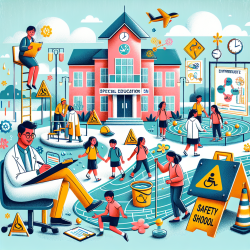Introduction
As a practitioner in the field of special education and therapy, staying updated with the latest research is crucial for improving your skills and providing the best care to your students. The research article "Rethinking Addiction" offers groundbreaking insights into how environmental factors and early interventions can significantly impact addiction and substance use disorders. This blog will explore the key findings of the research and how you can implement these insights into your practice.
Understanding Addiction Beyond Individual Choices
Addiction is often perceived as a series of individual choices, but the research by Ewald, Strack, and Orsini (2019) suggests that the environment plays a critical role in shaping these choices. The social and physical environments where individuals live, work, and play can influence brain plasticity, behavior, and health outcomes. This understanding challenges the traditional view of addiction and opens up new avenues for intervention.
The Role of Early Life Experiences
The research highlights the profound impact of adverse early life experiences on brain development and subsequent addictive behaviors. Chronic exposure to psychosocial stressors can lead to neurological changes that predispose individuals to addiction. By recognizing these early indicators, practitioners can identify at-risk youth and implement early interventions to mitigate these effects.
Implementing Early Interventions
One of the most promising aspects of the research is the potential for early interventions to induce corrective brain remodeling. Intensive, consistent, and supportive caregiving can reverse the negative effects of stress-induced changes in the brain. As a practitioner, incorporating trauma-informed care and focusing on the social determinants of health can enhance your intervention strategies.
Encouraging Further Research
The findings from "Rethinking Addiction" emphasize the need for a broader approach to addiction that considers environmental contexts. Practitioners are encouraged to continue exploring the interplay between genetics, environment, and behavior to develop more effective prevention and intervention programs.
Conclusion
By rethinking addiction and considering the environmental factors that contribute to it, practitioners can develop more comprehensive and effective strategies for intervention. This research not only enhances our understanding of addiction but also provides actionable insights for improving therapeutic practices.
To read the original research paper, please follow this link: Rethinking Addiction










